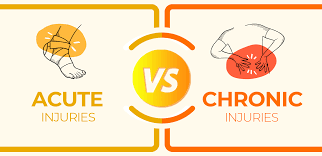 AI Blog Generation – Mass Content at Lightning Speed!
AI Blog Generation – Mass Content at Lightning Speed!
What Are the Symptoms of a Rotator Cuff Injury?
Written by Bridgwater Physiotherapy » Updated on: June 17th, 2025

The rotator cuff is a group of muscles and tendons that stabilize the shoulder joint and allow smooth movement of the arm. Whether caused by an acute injury or gradual wear and tear, a rotator cuff injury can lead to significant discomfort and limit daily activities. Understanding the symptoms of a rotator cuff injury is crucial for timely diagnosis and effective treatment.
If you're experiencing shoulder pain, seeking physio for rotator cuff rehabilitation can help restore mobility, reduce pain, and prevent further damage. In this guide, we’ll explore the symptoms of a rotator cuff injury and how physiotherapy treatment can support your recovery.
Common Symptoms of a Rotator Cuff Injury
A rotator cuff injury can present with various symptoms, depending on the severity and whether it’s a partial or complete tear. Here are the most common signs to look out for:
1. Persistent Shoulder Pain
Pain is often the earliest and most noticeable symptom. It may be felt deep within the shoulder joint and can worsen during activities like lifting, reaching, or sleeping on the affected side.
2. Limited Range of Motion
You may experience difficulty moving your shoulder freely. Simple tasks such as reaching behind your back or lifting objects above your head can become challenging.
3. Weakness in the Shoulder
Muscle weakness is a common symptom of rotator cuff injuries. Activities that require pushing, pulling, or rotating the arm may become difficult.
4. Cracking or Popping Sounds
Some individuals report hearing a clicking or popping sound when moving the shoulder. This can be a sign of tendon damage or joint instability.
5. Nighttime Pain
Pain often intensifies at night, particularly when lying on the injured shoulder. This can lead to disrupted sleep and increased discomfort.
Causes and Risk Factors of Rotator Cuff Injuries
A rotator cuff injury can occur due to:
Acute Injury: A sudden fall, lifting a heavy object, or trauma can cause tears or strains.
Repetitive Overuse: Athletes and individuals with jobs that involve repetitive shoulder movements are at higher risk.
Aging and Degeneration: As we age, tendons naturally weaken, increasing the likelihood of injury.
Poor Posture: Improper posture and muscle imbalances can put additional strain on the rotator cuff.
How Physio for Rotator Cuff Rehabilitation Can Help
Seeking professional physiotherapy treatment is one of the most effective ways to recover from a rotator cuff injury. A physiotherapy clinic in Winnipeg, like Bridgwater Physiotherapy, offers personalized rehabilitation programs to address your specific condition.
1. Pain Management
Physiotherapists use various techniques such as manual therapy, ice therapy, and electrical stimulation to reduce pain and inflammation.
2. Restoring Mobility
Targeted stretching and range-of-motion exercises are designed to gently improve shoulder flexibility and prevent stiffness.
3. Strengthening Exercises
Strengthening the muscles around the shoulder joint is essential for restoring function and preventing further injury. Your physiotherapist will guide you through progressive resistance exercises tailored to your needs.
4. Posture Correction
Physiotherapy includes posture correction and ergonomic advice to ensure proper shoulder alignment during daily activities.
5. Preventing Recurrence
A comprehensive rehabilitation plan will also focus on injury prevention strategies, ensuring long-term shoulder health.
When to See a Physiotherapist
If you experience shoulder pain that persists for more than a few days, or if it worsens with activity, it’s time to consider physio for rotator cuff rehabilitation. Additionally, those experiencing shoulder weakness, limited range of motion, or nighttime pain can benefit from a professional assessment.
A trusted physiotherapy clinic in Winnipeg like Bridgwater Physiotherapy will conduct a thorough examination, diagnose the severity of your injury, and create a customized treatment plan.
What About Related Conditions?
Shoulder injuries often lead to compensation in other areas of the body. For example, if you alter your movement patterns to avoid shoulder pain, it may result in strain on your wrist or lower back. In such cases, treatments like Wrist Physiotherapy Treatment or Physiotherapy for Lower Back Pain may also be recommended to address secondary issues and restore overall mobility.
Conclusion
A rotator cuff injury can significantly impact your quality of life, but with the right approach to recovery, you can regain strength, flexibility, and comfort. Early diagnosis and appropriate physio for rotator cuff rehabilitation are key to effective healing.
If you're experiencing symptoms of a rotator cuff injury, don’t wait. Visit Bridgwater Physiotherapy, a leading physiotherapy clinic in Winnipeg, to receive expert care and personalized treatment. With dedicated physiotherapists by your side, you can achieve a full and lasting recovery.
Note: IndiBlogHub features both user-submitted and editorial content. We do not verify third-party contributions. Read our Disclaimer and Privacy Policyfor details.
Copyright © 2019-2025 IndiBlogHub.com. All rights reserved. Hosted on DigitalOcean for fast, reliable performance.














